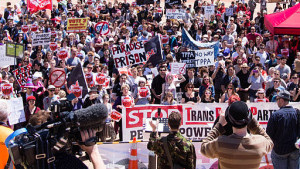If Wikileaks is to be believed, the hotly debated Trans Pacific Partnership (TPP) will push trade secret enforcement in those countries that are part of the TPP into criminal courts, rather than civil courts.
 The TPP is a proposed trade agreement signed on Oct. 5 by 12 Pacific Rim countries: the United States, Canada, Australia, Japan, Malaysia, Mexico, Peru, Brunei, Chile, New Zealand and Singapore. Depending on whom you believe, it will either usher in a glittering era of economic growth or environmental degradation and labor exploitation.
The TPP is a proposed trade agreement signed on Oct. 5 by 12 Pacific Rim countries: the United States, Canada, Australia, Japan, Malaysia, Mexico, Peru, Brunei, Chile, New Zealand and Singapore. Depending on whom you believe, it will either usher in a glittering era of economic growth or environmental degradation and labor exploitation.
Although the 12 countries reached agreement on the trade deal, the agreement itself is still cloaked in secrecy and hasn’t been officially released yet. Fortunately, trade talks are leaky boats, so Wikileaks has published various drafts of the agreement since 2013. According to those documents, the agreement will include a chapter covering intellectual property, including trade secrets.
The purpose of the IP section is to ensure that signing nations will enforce the IP rights of foreign companies doing business there. With regard to trade secret theft – including cyber theft – the TPP provides for “criminal procedures and penalties” rather than civil penalties.
As anyone who has worked in IP knows, trade secret enforcement is typically a civil matter in this country. And, for the most part, that’s been fine. The U.S. civil justice system is arguably the best in the world, with respected, well-educated judges presiding over cases with factual disputes often times resolved by well-intentioned juries. More importantly, corruption in the U.S. courts is very rare.
Of course, as I wrote back in February, the U.S. Justice Department is beginning to seek criminal prosecution of trade secret theft more frequently – a move likely prompted by the high number of data breaches that have occurred in recent years and only seem to be growing in frequency and severity. Those prosecutions also often cite the Computer Fraud and Abuse Act, which is primarily enforced in criminal court, although it does offer civil penalties as well.
With many of those data breaches perpetrated by foreign agents, it’s not surprising that a multi-national trade agreement such as the TPP would emphasize criminal prosecution over civil prosecution. Not every one of the signatory nations has a robust civil justice system, so pursuing a trade secret case in civil court in a foreign country is probably not a bet many companies are willing to make. Even if you manage to win in court, collecting damages or enforcing an injunction is no sure bet.
Certainly, moving trade secret enforcement to the criminal courts carries its own risks. Not only does a company need to convince a prosecutor that a crime occurred, but the burden of proof is higher in a criminal prosecution. And, in the end, although it may feel good to see the perpetrator behind bars, financial damages and injunctions are often preferred penalties for those in the business of making money.
It should be noted that, until the TPP text is officially made public, we won’t know if in fact it says what the Wikileaks document claims. However, if it does, and trade secret enforcement among the TPP nations is a criminal issue, it would be in line with what’s already trending in the United States.
Is that good news or bad news for American businesses? The devil will definitely be in the execution of the details.
